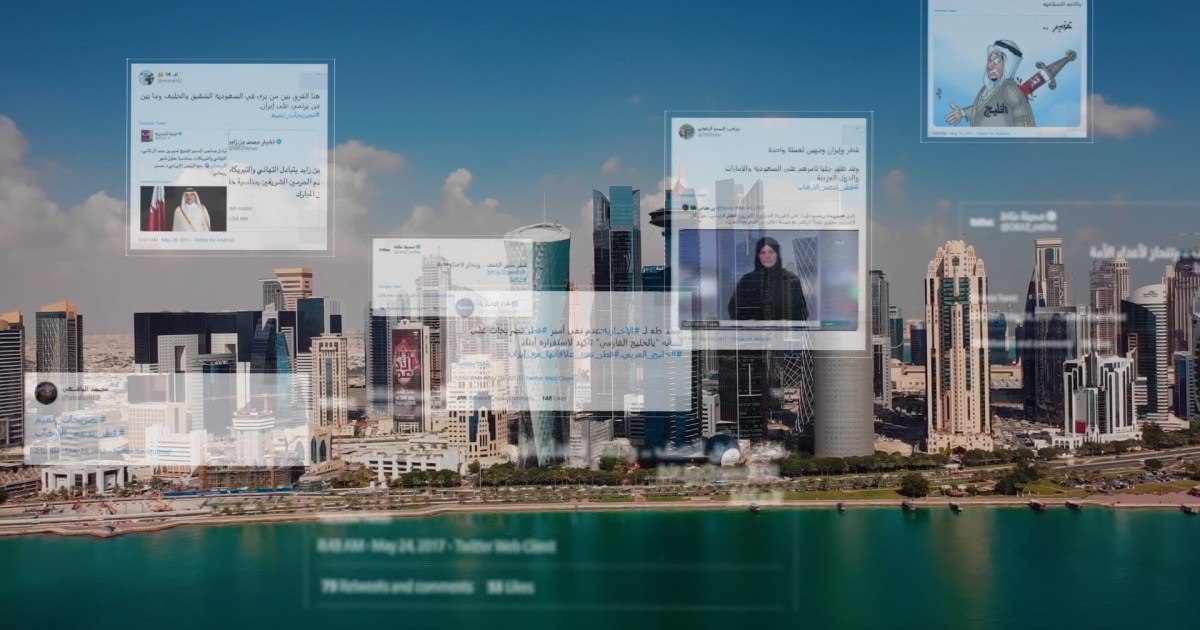For more than a year and a half, the investigative investigation, titled "Sita Letters," has been tracking sources of fake news and fake videos.
The program team was able to penetrate one of these networks and gain access to those who administer the deceptive electronic platforms.
In this regard, Ben Freeman, director of the Transparency Initiative at the Center for International Policy, said that there were research centers (funded by the UAE and Saudi Arabia) in the United States of America that were organizing conferences against Qatar before the blockade was announced, while the role of Saudi Arabia and the UAE in facing terrorism was praised.
In doing so, members of Congress are influenced to take decisions that harm Qatar's interests.
He pointed out that Saudi Arabia and the UAE have paid huge sums of money to research centers in Washington, explaining that in return these countries get several services, such as holding conferences to serve them or publishing research papers that serve their own interests.
The film reveals in two parts the mechanism of work of these networks on social media, behind the scenes of the movements of research centers in Washington funded by the UAE to incite against Qatar, and how they worked with the blockading countries to coordinate among themselves in conjunction with the penetration of the Qatar News Agency and the launch of organized electronic campaigns to attack Qatar.
For his part, Zaid Gilani, an investigative journalist for the American newspaper, The Intercept, said that if the UAE is able to establish relations with the Foundation for Defense of Democracies, which has a relationship with Congress, in this way it effectively affects members of Congress indirectly.
The film also revealed that the focus of the Foundation for Defense of Democracies conference on Al Udeid military base in Qatar was not a coincidence, as one of the e-mails between former US Defense Secretary Robert Gates and the UAE ambassador to Washington Yusef Al-Otaiba, one day before the conference, revealed clear incitement from the Emirati Crown Prince. Mohammed bin Zayed, to Qatar, to open the "gates of Hell" for them, as stated in the message.
For his part, Qatari Minister of Defense Khaled Al-Attiyah said that the relations of Qatar and America are not governed by the movements of research centers from foreign countries, but rather it is a relationship of a strategic alliance based on mutual respect and common interests, stressing the great efforts made by the State of Qatar to fight terrorism.
Al-Attiyah added that there is intelligence evidence documented by heads of state that proves that there was an intention to carry out a military invasion of the State of Qatar.
Regarding the scenario of fabricating the crisis in 2017, Mark Jones, a researcher specializing in digital humanities, explained that the pretext that was created for the Gulf crisis began with the piracy of the Qatar TV network, spreading false news and launching thousands of fake accounts on Twitter and Facebook to create fake public opinion in support of the war.
But the exciting thing is the adoption of a policy of disinformation to create an excuse, not only to penetrate the news site, but also to create fake people to draw false popular support for the war.
He explained that most of the accounts that were tweeting the tag "Qatar supports terrorism" were created only a month before the outbreak of the crisis.
Knowing that these accounts did not have any other activities, but that most of them only specialized in attacking the State of Qatar, and therefore they are part of a systematic campaign that was previously prepared, and someone has given the green light to launch it.

